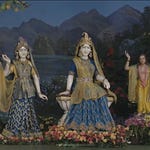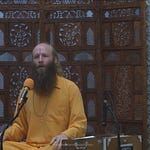Sadhana bhakti is of two types: vaidhi bhakti - raganuga bhakti. This you've been hearing about all week. So, in raganuga bhakti the vidhi-nished of the Vedas is waved, as we were just singing, “Vidhi-nished maryad vedaki rahati na yehi darbar.” In the darbar of Radharani, the do's and don'ts of the Vedas are waved for the raganuga bhakti followers. You learn that in raganuga bhakti, the first and foremost thing is that we have to do devotion with our mind, and in order to do that we practice roopdhyan.
Number two, you learn that we don't ask for worldly things from God, nor do we ask for liberation. This is if you want to be on this path of raganuga bhakti. All of our desires are channeled into one sentiment, “Krishna, I want you. And not only that, but I want You in order to serve You, so I can serve You for Your happiness.” That sentiment has to be there in raganuga bhakti. At least we have to try to develop it. It should be our desire to develop such selfless devotion, and with God and Guru's grace we will.
Number three, we learn that our love for God in raganuga bhakti is not restricted by any formality. Formalities of vaidhi bhakti can be followed in raganuga bhakti if they help you focus your mind on God or somehow help your devotion. But they're not given a primary place. You can follow certain rituals and formalities, but they're only done because, “When I do this, I feel more love for God.” That's the reason in raganuga bhakti.
Now, along with this, we say that in raganuga bhakti, instead of only thinking of God as God, we make Him mine by establishing one of four relationships with Him. There's a fifth relationship as well, but that's more distant and is not usually included in the category of raganuga bhakti. It's called shant bhav, when we love God as the king or queen and we are merely a subject in his kingdom. So, the king has many, many subjects and does not necessarily personally interact with any of them. They can admire him from a distance, but there's no adhikar (right) over the king. You have no right over the king to go and have any kind of personal interaction with him. So shant bhav is very distant.
So, we say in raganuga bhakti we bring Him closer, at least start dasya bhav. That means you may be the king but, “I'm your personal servant. So now I have the right to enter your private quarters in order to clean, sweep the floor, cook for you, right? The king has servants and they have such private access to the king's life, actually. So they're much closer than an ordinary subject.









